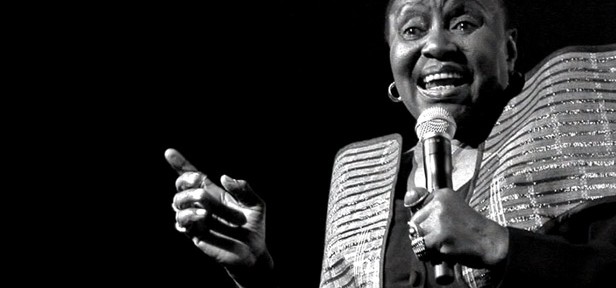Culture
Woodard Brings Momma Africa Home

Saint Louis, Missouri – Asueleni Deloney
TheVillageCelebration had the pleasure of sitting down to speak with Owen Woodard, an up-and-coming producer, about his current production project. He has dedicated his time and energy to capturing the life and legacy of Miriam McKeeba on the silver screen as well as theater stages across America. He chose this dual platform because of McKeeba’s rich cultural contributions as a political activist and songstress.
TVC: So when did producing began to interest you?
Woodard: I was living in Atlanta in 2008 when McKeeba died, and I began reading about her. Her story inspired me. I was intrigued by her music, her activism and the rich culture that surrounded her. So, with a co-worker of mine, I began writing an outline with the help of McKeeba’s biography, my background in video production, and my Masters in media communications.
TVC: Do you find it difficult to secure financial backing in the Midwest or are you looking at other areas/markets to tap for support?
Woodard: Other markets. I sent a letter to Euzhan Palcy, a French director who was the first black to produce a major film and who also is a huge inspiration to me and someone I’ve admired for some time. Her team responded to me saying that she is considering my project. That was very encouraging. I’ve also reached out to Kerri Washington as I would like for her to play the lead in the movie.
TVC: Wow, you’ve set the bar pretty high! Who else would you like to see play the various phases in McKeeba’s life in “Momma Africa Comes Home”?
Woodard: Whoopi Goldberg as Miriam McKeeba’s mother, Boris Kodjoe as Harry Belafonte, and Matt Damon as John F. Kennedy.
TVC: Have you ever considered going the Indie (independent) route?
Woodard: Oh, yes! Most definitely because you can craft it anyway you want to. I would like to be able to put it out that way and then be picked up by a major distributer.
TVC: What audience are you looking to capture with your movies?
Woodard: Oprah’s audience. With her opening the school in Africa and the “Living Your Best Life” campaign, she has an audience that can appreciate a story like this. She celebrates strong women, and this is definitely a story of one. Also age groups 18-65, and with the music that is part of it, it will draw the urban market and youth because her music is respected and known throughout the urban music industry.
TVC: What makes what you’re creating so different from what we are seeing today?
Woodard: It’s a work of inspiration. Miriam’s legacy pushes me to be not the dreamer, but the dream, her triumph over insurmountable odds offers lasting value. Twenty years from now she would have still left a lasting impression and her story needs to be told.
TVC: I understand that you want to turn McKeeba’s story into a play as well as a movie. Currently, you’re working on the movie and shopping the script for the play. Were you looking to release them simultaneously?
Woodard: Not exactly…although I want to tell her story on both platforms because there is so much of her story to tell, and I don’t want to leave anything out. I want to produce the movie first and tell the aspect of her civil rights involvement and allow that to set the stage for the play to tell the story of her early years and her music because the stage offers a different dynamic.
TVC: You are definitely passionate and focused. When it’s all said and done and you have delivered Miriam McKeeba to the world, what’s next for you?
Woodard: I have always loved music, and it’s always intrigued me as to what drives musicians to write what they write and what the person behind the music is all about. So there are artist stories I want to tell the way I’m currently telling McKeeba’s.
TVC: Really…who else?
Woodard: Ella Fitzgerald, Paul Roberson and Stevie Wonder.
TVC: You are seeking to change the course of what’s currently being produced. Do you feel the pressure to fit into the Hollywood mold?
Woodard: No, hopefully Hollywood comes to me. That’s why I’m so glad that Palcy knows (about the project) because she has pull in that area. I would love to work with the BBC because they are known for producing material with substance. I want to be known as a producer who’s more in to quality and not quantity.
[youtube id=”1cCUgeHgJco” width=”600″ height=”350″]

-

 Featured10 months ago
Featured10 months agoCalifornia Is the First State to Create A Public Alert for Missing Black Youth
-

 Featured10 months ago
Featured10 months agoAfrican American Leaders Stay the Course Amid Calls for President Biden To Bow Out of Race
-

 Featured10 months ago
Featured10 months agoThe Debate Fallout Lands on Both Candidates
-

 Featured10 months ago
Featured10 months agoPresident Joe Biden Decides to Withdraw from the Presidential Race
-

 Featured10 months ago
Featured10 months agoPresident Joe Biden Describes Shooting of Donald Trump As ‘Sick’
-

 Featured9 months ago
Featured9 months agoIn One of His Final Speeches as President, Biden Says It’s Time for ‘Fresh Voices’

